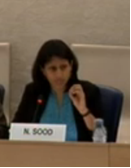ACPD represented on UN HRC panel during the Annual Discussion on gender integration
Action Canada for Population and Development (ACPD), a member of the Sexual Rights Initiative (SRI) coalition, was represented on the panel for the UN Human Rights Council’s (HRC) Annual Discussion on the integration of a gender perspective. The discussion took place as part of the official proceedings of the HRC’s 24th session. The topic of the discussion was “Civil society’s contribution to the integration of a gender perspective in the work of the Human Rights Council and its mechanisms.”

Ms. Neha Sood, Advocacy and Policy Officer for Action Canada for population and Development, discussed the SRI’s extensive contributions towards integrating a gender perspective into the HRC’s Universal Periodic Review (UPR) process and the SRI’s experience in raising human rights issues related to gender and sexuality in tracking Governments’ human rights records.
An opening statement was delivered by Ms. Navanethem Pillay, UN High Commissioner for Human Rights and the discussion was moderated by Ms. Nyaradzayi Gumbonzvanda, Secretary-General of the World YWCA and Panelists included: Mr. Chaloka Beyani, Chair of the Coordination Committee on Special Procedures and Special Rapporteur on the human rights of internally displaced persons, Ms. Mozn Hassan, Nazra for Feminist Studies, and Ms. Penny Williams, Australia’s Global Ambassador for Women and Girls.
Sood drew attention to the role that the SRI has played in bringing attention to gender-related issues throughout the UPR process, “…the Sexual Rights Initiative has brought focus in a sustained manner to marginalized issues pertaining to gender equality, women’s rights, sexual rights and reproductive rights, such as safe and legal abortion, contraception, comprehensive sexuality education, adolescent sexual and reproductive health, and sexual violence, including marital rape.”
Sood acknowledged a number of the opportunities and challenges facing sexual and reproductive rights advocates at the Council, and, more specifically, with the UPR process. According to Sood, advancing human rights, specifically those related to gender and sexuality, requires greater commitment of Governments. This requires, for example, create environments in which women’s human rights defenders are not at risk of reprisals and opportunities for civil society organizations and activists to consult with governments in the development of national reports and decisions regarding which recommendations should or should not be accepted.

Beyani echoed the views of other panelists by recognizing the need to draw attention to transforming oppressive structures that uphold violations of women’s human rights. This includes addressing negative gender stereotypes and norms that perpetuate gender-based inequalities. According to Beyani, “…mandate holders, with the support of the Council and civil society partners, will continue to make consistent and genuine efforts to examine the underlying structural inequalities that perpetuate discrimination based on sex and gender…”
Providing concrete examples of the ways in which women experience discrimination and stigma, based on their gender, Hassan drew attention to the relationship between women’s bodies and activism, emphasizing the protection and promotion of the human rights of women human rights defenders in the public sphere and the creation of strategies to safeguard their participation in public spaces.
Sood reiterated such an approach, expressing that the Council must deal with the full spectrum of human rights, including those related to gender and sexuality. Failure to do so prevents the integration of a gender perspective and the realization of women’s human rights.
Panelists also acknowledged opportunities for greater integration of a gender perspective into the work of the Council, beyond the UPR. Central to this work is the issue of accountability. According to Sood, this requires “committing resources to ensure monitoring and evaluation of efforts, and building the capacity of all those in positions of developing, implementing and monitoring human rights and development policies and programmes.”
An archived webcast of the event can be viewed, here. (Neha Sood’s speech begins at 24mins, 43 seconds.)
A concept note for the event can be found, here.
Ms. Navanethem Pillay’s speech can be found, here.
Mr. Chaloka Beyani’s speech can be found, here.
Ms. Mozn Hassan’s speech can be found, here.
Ms. Penny Williams’ speech can be found,here.
Ms. Neha Sood’s speech can be found, here.